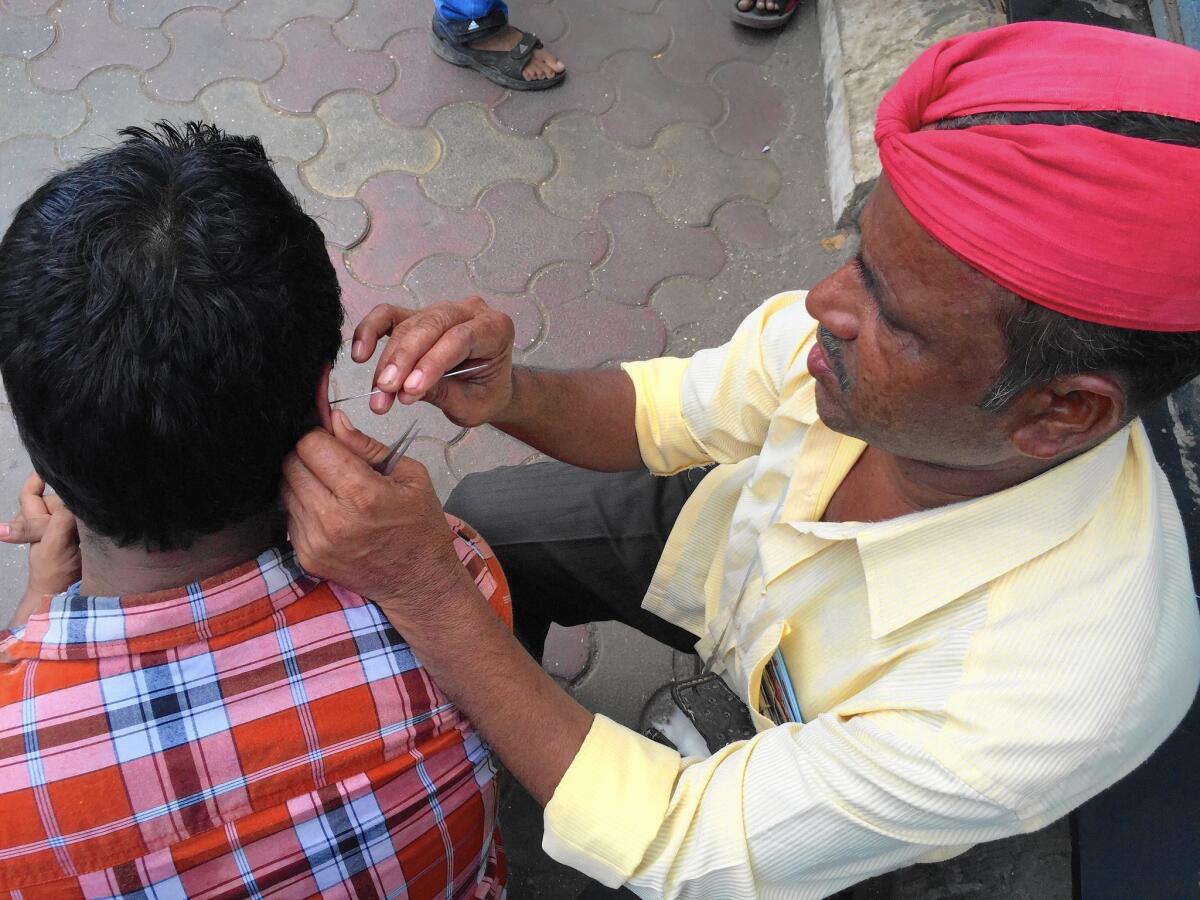India’s traditional ear de-waxing business is waning

- Share via
Reporting from Mumbai, India — Squatting on a low wooden stool, Sayed Mehboob adjusts his red turban, gently faded from countless hours in the afternoon sun. On this patch of sidewalk near the busy Grant Road train station in central Mumbai, modern India flies by in its customary hurry.
Young laborers with rough hands and precise haircuts set off on lunch break. Packs of students race to after-school tutoring sessions or home to play video games. Air-conditioned sedans pull over, their rear doors disgorging upper-class housewives from buttery leather seats.
Unfazed by the din, Mehboob, 45, slides a smaller stool toward a visitor and flashes an inviting smile.
“Would you like me to clean your ear?” he asks.
It seemed an unusual request, particularly on the frenetic, less-than-pristine streets of India’s commercial capital. Who in this city has time to stop and get his ear cleaned? And who would think of having it done on the street, by a man with a battered leather satchel of unmarked vials dangling from his shoulder?
Yet swabbing dirt and wax out of people’s ears has been Mehboob’s business for more than two decades. Amid the snack vendors, holy men and cobblers who repair shoes with strips of tire, a few hardy kaan saaf wallahs, as they are known in Hindi, still dot the sidewalks of Mumbai, identified by the red handkerchiefs tied around their heads.
A young man in an orange plaid shirt approaches Mehboob, who motions toward the empty stool. Gaurav, a 21-year-old housekeeper here for his occasional cleaning, sits down stiffly, like a boy in a dentist’s chair.
Mehboob props his bag of tools on one leg. He pulls out a steel pin the length of a pencil, swathes the tip in a wad of cotton and guides it toward Gaurav’s aural canal.
In Mumbai, a commercial hub of more than 12 million where seemingly no job is too small, many of the last remaining traditional ear cleaners hail from southern India. Some trace the profession to the 18th century, when India was under Mogul rule and much of the southern region belonged to the nizam or monarch, of Hyderabad.
Mehboob, who was born outside Hyderabad, learned the trade when he came to look for work in Mumbai 25 years ago, when it was still known as Bombay. After laboring in construction for a few years, a fellow southerner taught him how to clean ears.
“It was just something to do,” he says. In the crowded city, with vehicles and construction sites fouling the air with fumes and dust, he describes getting one’s ears professionally cleaned as “a normal practice.”
Mehboob charges 20 rupees, or about 30 cents, for a standard cleaning of both ears with cotton and hydrogen peroxide. It takes less time than a good shoeshine. The deluxe treatment can include daubs of lotion, coconut oil and a dark liquid that Mehboob described as an ayurvedic tonic, and costs 50 rupees, or 80 cents.
“That’s if the ear is inflamed, or if it’s really red,” he says. “The lotions provide a soothing effect.”
His method is to dip the cotton-tipped pin in hydrogen peroxide and scrape the outer ear canal before proceeding to the inner canal. An old pair of tweezers helps pick out stubborn bits of dirt and wax.
A routine day brings about a dozen customers, he says. For long stretches he sits alone in front of a former phone booth, its rusted doors padlocked shut. In the late afternoon, he moves farther down the road, hoping to catch commuters disembarking from a train on their way home.
It is unlikely that most young people who pass him on the street know what he does, or recognize the meaning of the red turban. Most of his regular customers are elderly, he says, although they are loyal, some even summoning him to their apartment for house calls.
“Rich people,” he says proudly.
Mumbai’s ear cleaners have a checkered reputation. Foreigners tell stories of being accosted along the promenade near the Gateway of India monument by red-turbaned men waving needles. With the advent of cotton swabs and obsessive hygiene, the trade seems destined for extinction.
In a decent month, Mehboob saves the equivalent of $80 after deducting the little he pays for rent. He shares a room nearby with 15 men — day laborers, taxi drivers, security guards — most of them migrants, all Muslims in a staunchly Hindu neighborhood.
They are the unsung of Mumbai, the people who run the basic machinery of the city, and then there is Mehboob, a fading relic in every way.
He owns nothing of value here, not even a cellphone. He deposits his earnings with a broker instead of in a bank, preferring to carry his savings back to his hometown when he returns every few months to visit his family and their tiny plot of farmland.
Yet Mehboob has trained his nephew, so there could be at least one more generation of ear cleaners in Mumbai. He dismisses the word of doctors who advise patients with earaches not to visit men like him, warning of infections and scrapes.
“Of course the doctors say that,” he says. “It’s good for their business.”
More to Read
Sign up for Essential California
The most important California stories and recommendations in your inbox every morning.
You may occasionally receive promotional content from the Los Angeles Times.














